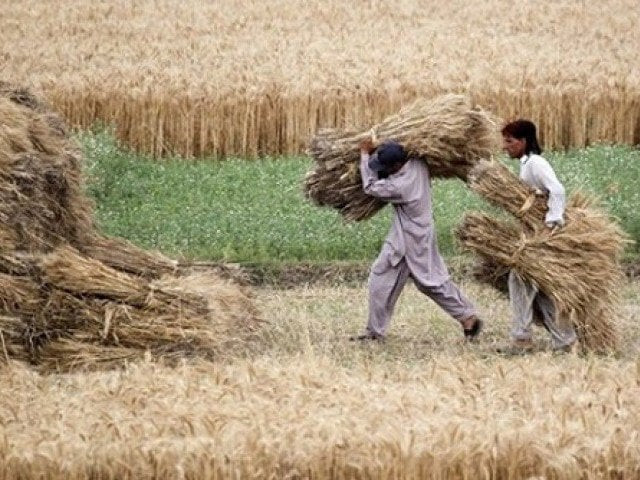State-of-the-art: Scientists introduce latest machine for wheat sowing
New technology allows farmers to plant wheat without removing rice residue

Farmers in Punjab celebrate rainfall in cropping season
The machine, named Pak Seeder, helps in wheat sowing without having the need to remove rice residue and prepare land for plantation.
Handling rice residue has been a major challenge for farmers in the rice and wheat cropping system. The residue is either removed or spread over the field manually.
Mostly, the farmers prefer to burn it as an easy and cost-effective way of disposal. However, this process not only causes loss of precious crop nutrients, but also poses a threat to the environment, human health and economy. It also contributes to smog during winter which has become a major public health and environmental issue, particularly in Punjab, in recent years.
According to Parc, the new technology will address these crucial issues.
Talking to The Express Tribune, Parc officials said it took almost a decade to design the new machine and make experiments, adding the machine was launched and exhibited for the farmers near Muridke on Saturday last week.
Different approaches were made and experiments conducted over the past 12 years that led to the development of Pak Seeder. “It is a unique technology that helps sow wheat without disturbing the soil condition or removing the rice residue,” said a statement issued by Parc.
“Rice and wheat growers can conserve their resources, time and money by adopting this technology. It not only improves soil’s biological and physical health, but also increases wheat and rice yields.”
Parc Chairperson Dr Yusuf Zafar appreciated efforts of Parc engineers and scientists for developing the state-of-the-art machine for wheat sowing in the presence of heavy rice residue for the first time in Pakistan.
“It will help in increasing earnings of rice farmers and wheat growing areas. Burning of rice residue has been a big problem for Pakistan as well as South Asian countries and Pak Seeder is a breakthrough, which will not only save time and resources, but will also enhance crop production,” said Zafar said while speaking at the launch ceremony.
Highlighting the role of scientists, manufacturers, service providers and farmers in introducing the technology, he emphasised that Parc engineers were playing a vital role in developing resource conservation technologies like Pak Seeder. International Centre for Agriculture Research in Dry Areas (Icarda) Country Head Dr Abdul Majid outlined his organisation’s role and activities in Pakistan, saying research was not a one-day process, rather it took years to resolve a problem. He underlined the importance of farmers’ role and cooperation with machinery manufacturers and researchers in further developing Pak Seeder.
After its successful launch, Parc will sign a memorandum of understanding with the manufacturers for promoting the technology on commercial lines.
Published in The Express Tribune, March 30th, 2018.
Like Business on Facebook, follow @TribuneBiz on Twitter to stay informed and join in the conversation.



















COMMENTS
Comments are moderated and generally will be posted if they are on-topic and not abusive.
For more information, please see our Comments FAQ